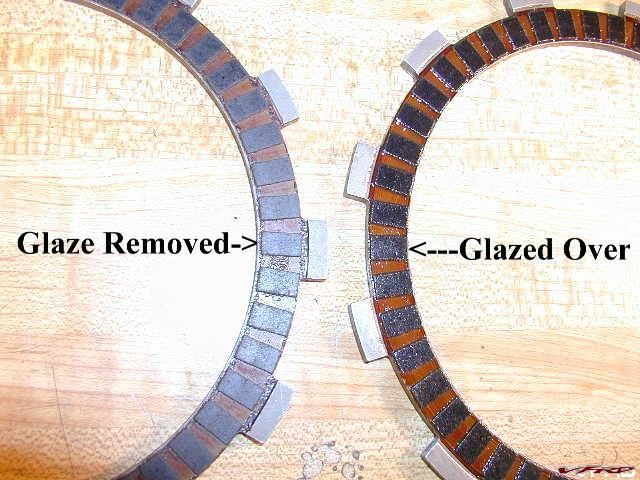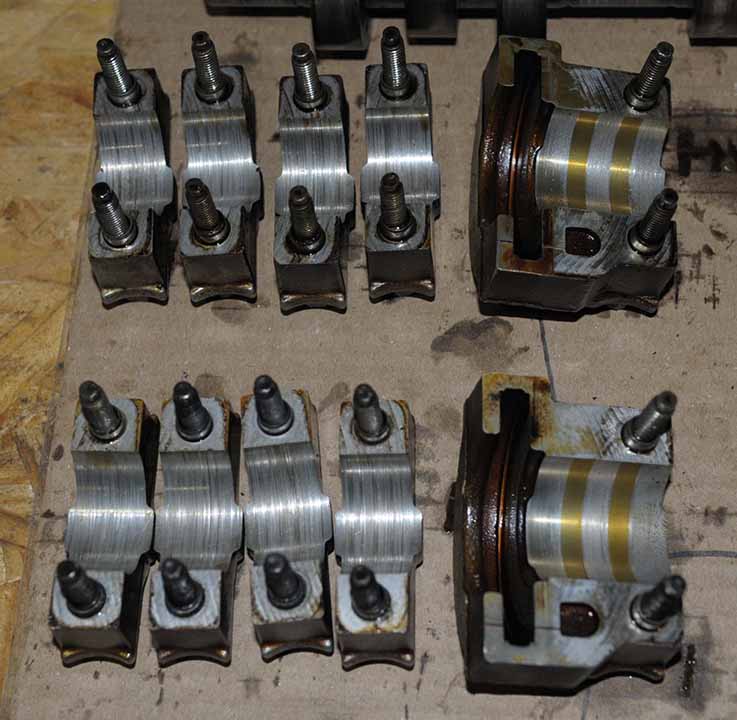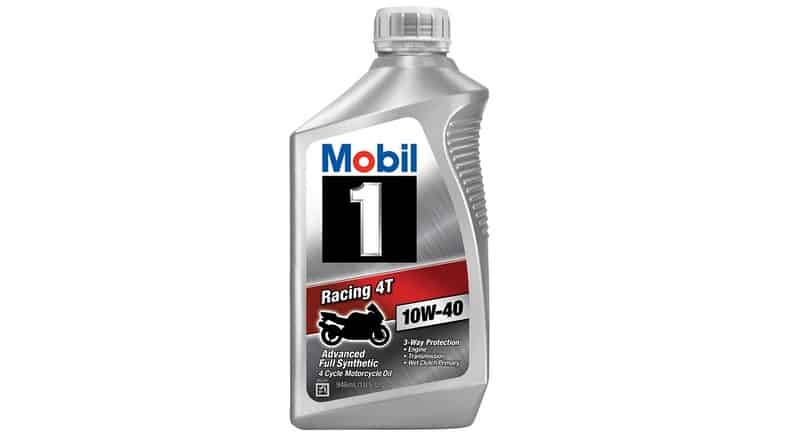- Home
- Forums
- Motorcycles, Boating, Small Engine, Aviation, Powe
- Motorcycles and Motorcycle Lubrication
You are using an out of date browser. It may not display this or other websites correctly.
You should upgrade or use an alternative browser.
You should upgrade or use an alternative browser.
Does Mobil1 racing 4t 10w40 has Molybdenum-based?
- Thread starter firstime911
- Start date
- Status
- Not open for further replies.
Actually it warns against “additives”. There is no mention of the moly content of engine oils. While some may contain Moly...I don’t think there is such a thing as “Molybdenum-based“ engine oils.
I read it as “do not add a moly additive”. Could it mean “do not use an oil with ANY moly”? Hmmmm....
I read it as “do not add a moly additive”. Could it mean “do not use an oil with ANY moly”? Hmmmm....
Plenty of MC oils have moly in them. My thought is when you're talking 100 or 200 ppm, in a quart of oil, that would not be moly based.
Did a quick check, RedLine MC oil has been known to have very high moly content however their current product data sheets show a greatly reduced amount.
Did a quick check, RedLine MC oil has been known to have very high moly content however their current product data sheets show a greatly reduced amount.
Mileage not moly is the observed cause of clutch slippage...
The holy trinity of science is 1)Reason 2)Observation 3)Experience...
employing those tools we observe that the primary cause clutch slip
are high mileage... mileage is the constant among all of the clutches
that begin to slip... oil choice whether JASO approved or not is not a
constant... High mileage is the constant where all clutches begin to
loose grip due to normal glazing and contaminates that build up over use...

Redline is not only heavy on moly but JASO MA approved... mounting
evidence that Moly will not and has never been the culprit responsible
for clutch slip... look to high mileage...
Noted Motorcycle oils that also employ moly...
Honda GN4
Suzuki Ecstar
Motul 7100
Asmoil MC
Mobil 4T
The holy trinity of science is 1)Reason 2)Observation 3)Experience...
employing those tools we observe that the primary cause clutch slip
are high mileage... mileage is the constant among all of the clutches
that begin to slip... oil choice whether JASO approved or not is not a
constant... High mileage is the constant where all clutches begin to
loose grip due to normal glazing and contaminates that build up over use...

Redline is not only heavy on moly but JASO MA approved... mounting
evidence that Moly will not and has never been the culprit responsible
for clutch slip... look to high mileage...
Noted Motorcycle oils that also employ moly...
Honda GN4
Suzuki Ecstar
Motul 7100
Asmoil MC
Mobil 4T
Does Mobil 1 racing 4t 10w 40 has it??
Yes... Mobil 1 virgin Oil sample shows 91 ppm Moly... but BMW own 5w30 oil has 126 ppm Moly so technically speaking they are not worried about Moly attacking engine coating...
The word "moly" is used often but can mean different things. For many people "moly" is shorthand for "molybdenum disulfide", or MoS2. This is a solid and is usually deployed as an aftermarket oil treatment additive. This is an approach most, if not all OEMs forbid.
The element molybdenum also shows up in more traditional oil additives though, used in oils alongside other additives as part of the designed package. In this form it is liquid and is built in to the oil's performance design and is perfectly acceptable to OEMs, so long as the required specification is met.
The element molybdenum also shows up in more traditional oil additives though, used in oils alongside other additives as part of the designed package. In this form it is liquid and is built in to the oil's performance design and is perfectly acceptable to OEMs, so long as the required specification is met.
I’ve used this with no problems...

Yes... Mobil 1 virgin Oil sample shows 91 ppm Moly... but BMW own 5w30 oil has 126 ppm Moly so technically speaking they are not worried about Moly attacking engine coating...
View attachment 31280
View attachment 31281
Here we go again with the posting of VERY outdated formulations.
There is no moly in Liqui Moly...


Unfortunately, we are past the point “here we go again...”. We are already “going again” since that post has seen the light of day.Yes... Mobil 1 virgin Oil sample shows 91 ppm Moly... but BMW own 5w30 oil has 126 ppm Moly so technically speaking they are not worried about Moly attacking engine coating...
View attachment 31280
View attachment 31281
The M1 10w40 4T uoa I posted in the past couple weeks has 12 ppm moly, the same oil from my 2018 uoa had 3 ppm moly.
To the OP, No, M1 10w40 does not have it in any amount to matter. Please see my recent thread here so you aren’t ridiculously misled. https://www.bobistheoilguy.com/forums/threads/zrx-1200-mobil-1-10w40-4t-5345-miles.332497/
That is an outdated 10w40 4T analysis as referenced a few posts back, it has been outdated for at least a decade or more, and is not accurate information. Easy to identify with the other additives so far out of whack compared to what Mobil shows for their current formulation, and multiple posters even in different threads when it shows up have pointed that out. And the BMW VOA is from 14 years ago.
Last edited:
I’m going to ask this and put my flame suit on. How many of you have had major engine failures by running a name brand oil and changing it st required intervals? I have been riding for over 40 years and have had countless bikes and run countless name brand oils and have never had an engine problem.
Is it just me or is the great oil debate ridiculous?
Is it just me or is the great oil debate ridiculous?
^^^ Good post^^^ With that said, I have seen better wear rates with some oils vs other oils, so there is validity, in my opinion, to an oil being more suited to a specific engine or even riding style based on consistent UOA’s and the results. But to say because one oil gave better results wear-wise in my engine doesn’t mean it will in another engine. But no out-right failures have been noted here in a long time, if ever.I’m going to ask this and put my flame suit on. How many of you have had major engine failures by running a name brand oil and changing it st required intervals? I have been riding for over 40 years and have had countless bikes and run countless name brand oils and have never had an engine problem.
Is it just me or is the great oil debate ridiculous?
Moly is not an issue with respect to a wet clutch, as has been noted. Redline MC oils have had very high moly content, however I do see in their recent PDS sheets that has been lowered quite a bit.
Reading the info again in the first post, I take that to mean additives as well and not an oil itself. Ammolab had it right in the second post. Here is a thread from this forum with a VOA of BMW 15w50 Advantec oil, with a decent moly content. The same question is brought up with respect to the moly content by one of the posters. That being the case, M1 10w40 4T has very little moly content relative to what BMW has in its own branded motorcycle oil.
https://www.bobistheoilguy.com/foru...-pro-15w50-motorcyle-oil.254460/#post-4167736
Mileage not moly is the observed cause of clutch slippage...
The holy trinity of science is 1)Reason 2)Observation 3)Experience...
employing those tools we observe that the primary cause clutch slip
are high mileage... mileage is the constant among all of the clutches
that begin to slip... oil choice whether JASO approved or not is not a
constant... High mileage is the constant where all clutches begin to
loose grip due to normal glazing and contaminates that build up over use...
Redline is not only heavy on moly but JASO MA approved... mounting
evidence that Moly will not and has never been the culprit responsible
for clutch slip... look to high mileage...
Noted Motorcycle oils that also employ moly...
Honda GN4
Suzuki Ecstar
Motul 7100
Asmoil MC
Mobil 4T
Interesting. This is the first I have heard of this. I would not consider 130ppm very much Moly. But what do I know....
I’m going to ask this and put my flame suit on. How many of you have had major engine failures by running a name brand oil and changing it st required intervals? I have been riding for over 40 years and have had countless bikes and run countless name brand oils and have never had an engine problem.
Is it just me or is the great oil debate ridiculous?
I would have to say it depends on the type of oil and conditions the motor was running. An example: My XR 600R when running on old school conventional oil had an oil related failure due to running in the desert summer heat. The oil was tapped out at almost 330 degrees for most of the day. There is no conventional oil made to date that can take those kind of temps.
Fast forward to the same motor running Motul 300V in the same operating conditions. Zero failure issue. Beta 498cc 300V running a hard trail for over an hour at 325 deg, gas boiling, and no issue whatsoever with oil failure. In fact at 10,000+ miles and over 300hrs it is running as strong as it did new.
Cheap oils rear their ugly head in extreme conditions. I learned long ago to use only the very best ester based oil in my powersport vehicles. If you are operating at normal temperatures there is really no reason to spend the money on expensive ester based oils.
Last edited:
I’m going to ask this and put my flame suit on. How many of you have had major engine failures by running a name brand oil and changing it st required intervals? I have been riding for over 40 years and have had countless bikes and run countless name brand oils and have never had an engine problem.
Is it just me or is the great oil debate ridiculous?
oil pump failure yes...oil failure NO!!!
which is why the amsoil warrenty is not worth the toilet paper its written on.
My thought is 130 ppm moly isn’t high, but that was when Redline was throwing something like 600 ppm into their MC oils and there haven’t been issues. I shot an email off to Redline this morning asking about the major reduction down to 130 ppm moly in their specs which I am pretty sure is within the last year or less.
From my reading, moly and boron both do a similar job at forming a surface layer that reduces friction. Moly binds/adheres/fills microscopic surface imperfections in metal surfaces as I read it, while Boron does have a cleaning property that lifts impurities from the metal surface and then forms a hard/slippery surface. With that understanding, it would make sense that both sides are correct when saying boron is a cleaner/dispersant and also an anti-wear additive. I don’t read that moly has any inherent cleaning properties, but my simple layman’s understanding could be off base with that.
I also understand that boron is a better EP additive, part for part, than zinc and may be why it is showing up in oil as zinc and phos numbers have dwindled. It covers two bases with respect to a cleaner/dispersant and anti-wear.
The boron content of both M1 10w40 4T and 20w50 V-Twin is in the 160 ppm range based on my last 3 UOA’s, however both have good z/p numbers, to my liking as well.
From my reading, moly and boron both do a similar job at forming a surface layer that reduces friction. Moly binds/adheres/fills microscopic surface imperfections in metal surfaces as I read it, while Boron does have a cleaning property that lifts impurities from the metal surface and then forms a hard/slippery surface. With that understanding, it would make sense that both sides are correct when saying boron is a cleaner/dispersant and also an anti-wear additive. I don’t read that moly has any inherent cleaning properties, but my simple layman’s understanding could be off base with that.
I also understand that boron is a better EP additive, part for part, than zinc and may be why it is showing up in oil as zinc and phos numbers have dwindled. It covers two bases with respect to a cleaner/dispersant and anti-wear.
The boron content of both M1 10w40 4T and 20w50 V-Twin is in the 160 ppm range based on my last 3 UOA’s, however both have good z/p numbers, to my liking as well.
I’m going to ask this and put my flame suit on. How many of you have had major engine failures by running a name brand oil and changing it st required intervals? I have been riding for over 40 years and have had countless bikes and run countless name brand oils and have never had an engine problem.
Is it just me or is the great oil debate ridiculous?
I have 55 years of riding and racing with 0.0 failures credited to
single oil brand... I've noted failures on the race track but only due
to the pump sucking air after the rider tossed it...
The more you research oil the more you realize any of it will meet or
exceed your mile expectations... there is not one oil in the 300,000
mileage club... there are 30 40 50 grade oils... there are synthetic
and mineral oils... the only difference is how much HP do you want
to waste on unessessary oil drag???

The original post attachment from BMW looks vey straight-forward to me:
SAE 5W-40, API SL, / JASO MA2 No Additives !! How could anyone overthink that ??!!

SAE 5W-40, API SL, / JASO MA2 No Additives !! How could anyone overthink that ??!!
I have 55 years of riding and racing with 0.0 failures credited to
single oil brand... I've noted failures on the race track but only due
to the pump sucking air after the rider tossed it...
Have you ever ridden extreme off road and heated the oil over 320 degrees? I will say oil brand does not have much to do with an oil related failure. Oil type most certainly will effect the outcome of being left stranded vs making it back to the truck.
Now if you want to talk two strokes with an oil pump then there was an exact brand of oil that caused blown up motors in the 90's. I had a Sea Doo that seized twice due to using Amsoil injector oil. Both times it was fixed under warranty. After the second time the dealer made it clear to me and anyone purchasing a Sea Doo that they were no longer doing warranty claims for anyone using the Amsoil. The root cause was determined to be that the oil foamed up and caused air bubbles in the oil lines.
At the time 2T Amsoil was very popular in power sports. It makes a really good oil when premixed. Motors and powervalves were really clean when serviced. After my warranty ended I bypassed the oil injector and continued to use Amsoil 2T premixed with no issue.
the only difference is how much HP do you want
to waste on unessessary oil drag???
Incorrect. A viscosity too low for the application and temperatures will result in excess wear rates. Period, end of story. The top picture is what happens when high inertial loads are coupled with oil that can't handle the load. The bottom picture is what happens when a very low viscosity oil is used and an insufficient amount makes it to the head due to it pumping rapidly out in the lower end.
Choose the correct viscosity for the application, choose a quality oil and change the oil regularly. Note: The correct viscosity for the application may not be the manufacturers suggested viscosity. Internet forums, warranty claims and racing results help fine tune these real world requirements.

Last edited:
- Status
- Not open for further replies.
Similar threads
- Replies
- 23
- Views
- 3K
- Replies
- 27
- Views
- 3K
- Replies
- 18
- Views
- 2K
- Replies
- 102
- Views
- 6K


